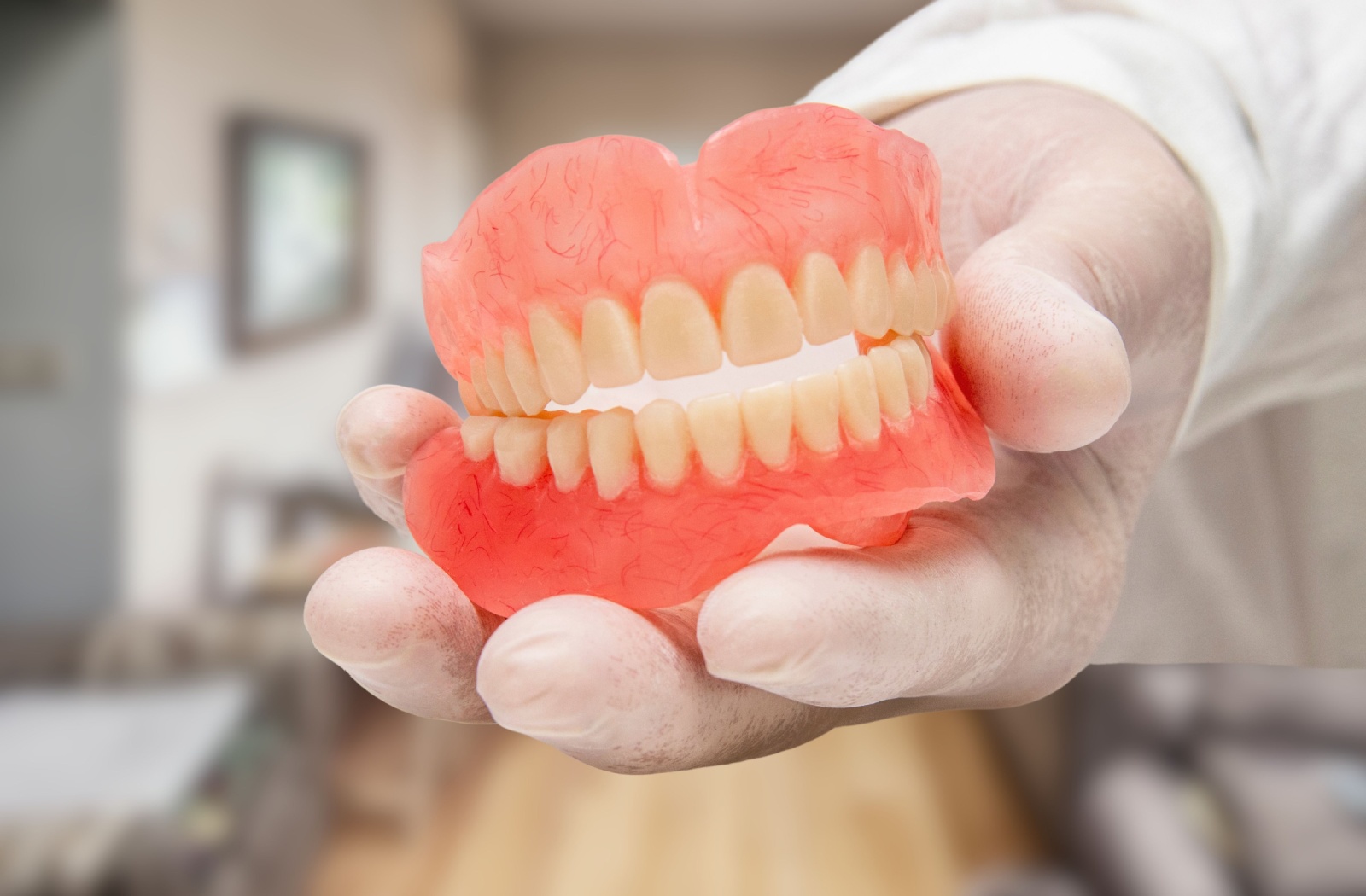Dentures are a great way to restore your smile if you’re missing a handful or many teeth. But if you think having dentures means you’re off the hook from daily oral hygiene or visits to your dentist, think again.
Dentures still require routine maintenance and care, just not in the way you might think. This helps preserve their lifespan because dentures don’t last forever. With solid care, a complete set of dentures can last 5 to 8 years, partial dentures can last 7 to 10 years, and the denture portion of implant-supported dentures needs replacing every 10 to 15 years.
If you have dental insurance, check your coverage. Many plans cover at least a portion of denture replacement after a certain period, typically 5 to 7 years.
The Lifespan of Dentures
It feels as though almost everything these days has a shelf life. From glasses to cars, it’s natural for everyday necessities to need an upgrade, and dentures are no exception. With proper care, though, you can make the most of these years.
Full Dentures vs. Partial Dentures
The type of denture you have matters. Full dentures, for example, can last between 5 to 8 years with proper care, while partial dentures often last longer, closer to the 7 to 10 year mark.
Full dentures are complete tooth replacements, which means they experience more wear since they take on all your chewing forces. The acrylic base can develop cracks or chips over time, and the artificial teeth may wear down from regular use.
Since partial dentures work alongside your natural teeth, they don’t bear the full brunt of chewing forces. However, they do have metal clasps and connectors that can wear out or break over time.
Implant-Supported Dentures
Implant-supported dentures represent the gold standard for denture longevity. Not only do they provide solid stability and help preserve your jawbone, but the implants themselves can last for 20 years (or longer) with proper care. The denture portion typically needs replacement every 10 to 15 years.
What Affects the Lifespan of Your Dentures?
Dentures will wear with time, that’s a given. But it isn’t the only defining factor that matters. Here’s a closer look at what else can affect the lifespan of your dentures:
Material Quality
The material of your dentures significantly affects their durability. Acrylic, resin, and porcelain teeth last longer and resist staining, cracking, and wear better than more affordable options.
While these materials might cost more initially, their durability contributes to a longer lifespan, offering solid comfort and function. In the end, this makes them more cost-effective over time.
Natural Changes
Your mouth naturally changes over time. After losing a tooth, your jawbone gradually shrinks because of bone reabsorption. This means even well-fitting dentures will eventually become loose as your mouth structure changes.
Most people need denture adjustments or relines every 2 to 3 years to maintain proper fit.
Daily Wear & Tear
How you use your dentures affects their lifespan. Chewing hard foods, grinding your teeth at night, or using your dentures as tools (like opening packages) can cause premature wear or damage. People who eat predominantly soft foods may find their dentures last longer.
Maintenance & Care Habits
Caring for your dentures is key to their longevity. Daily cleaning, proper storage, and regular dental checkups can significantly extend your dentures’ lifespan. Neglecting care leads to bacterial buildup, staining, and accelerated wear.
Signs Your Dentures Need Replacement
Your dentures will show signs of wear, telling you that it’s time for a replacement or adjustment. Here’s what to look for:
- Fit Issues: Loose or ill-fitting dentures are often the first sign you need replacements. If your dentures slip while eating or speaking, cause sore spots, or require excessive adhesive to stay in place, it’s time for an evaluation.
- Visible wear and damage: Cracks, chips, or worn-down teeth indicate your dentures are reaching the end of their useful life. Even small cracks can harbour bacteria and lead to oral health issues.
- Persistent Discomfort: If your dentures consistently cause pain, irritation, or sore spots that don’t resolve with adjustments, replacement might be necessary. Well-fitting dentures should feel comfortable throughout the day.
- Changes in Speech or Eating: Having trouble pronouncing certain words or problems chewing foods you once ate with ease are signals that your dentures no longer fit properly.
Tips for Extending Denture Life
Although it’s normal to replace your dentures, taking good care of them can help extend their life:
Proper Daily Care
Clean your dentures daily with a soft-bristled brush and denture cleaner. Avoid regular toothpaste, which can be too abrasive.
Remove dentures overnight and soak them in a denture solution or plain water.
Handle with Care
Always handle dentures over a towel or bowl of water to prevent damage if dropped. The acrylic material can crack or break easily when dropped on hard surfaces.
Routine Dental Exams
With or without dentures, everyone benefits from routine dental exams. Regularly checking in with your dentist for adjustments helps your dentures stay comfortable.
Besides, your dentist is here to monitor your oral health. With routine exams and cleanings–ideally every 6 months–they assess your gum tissue, bone levels, and any remaining natural teeth. Detecting any concerns early helps prevent complications that could affect denture fit or comfort.
Protect Your Investment
Consider a night guard if you grind your teeth, and avoid using your dentures to open packages or bite non-food items. These habits can cause premature wear or sudden breakage.
Maintain Oral Health
Even with dentures, maintaining good oral hygiene is essential. Clean your gums, tongue, and any remaining natural teeth daily. This prevents infections and maintains healthy tissues that support your dentures.
Making the Most of Your Dentures
Your dentures are an investment in your oral health, confidence, and quality of life. While they won’t last forever, proper care and regular upkeep can help you get the most from them.
Remember that everyone’s situation is unique, with several factors influencing how long your dentures will last. Working closely with your dental team means you receive advice and care tailored to your specific needs.
If you’re experiencing issues with your current dentures or considering new ones, don’t wait! Connect with our Grand West Dental team to book an appointment. We’re here to help you keep your smile bright and beautiful!









